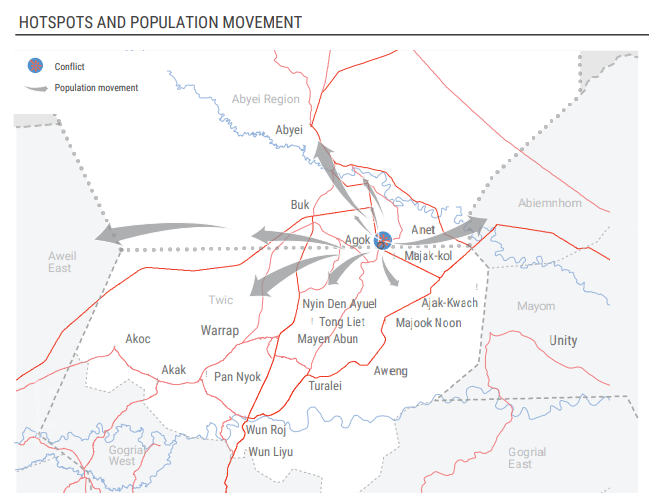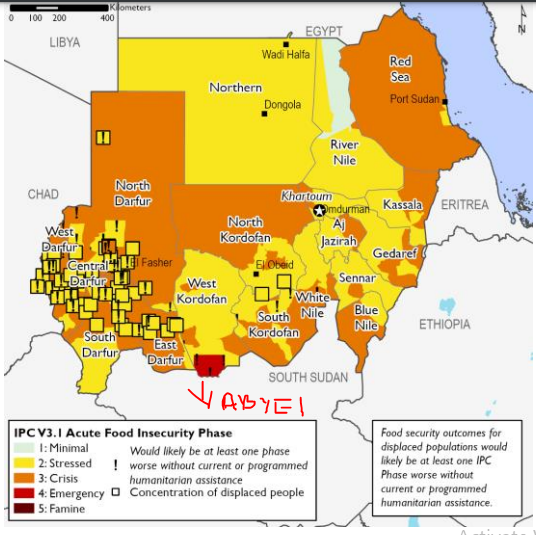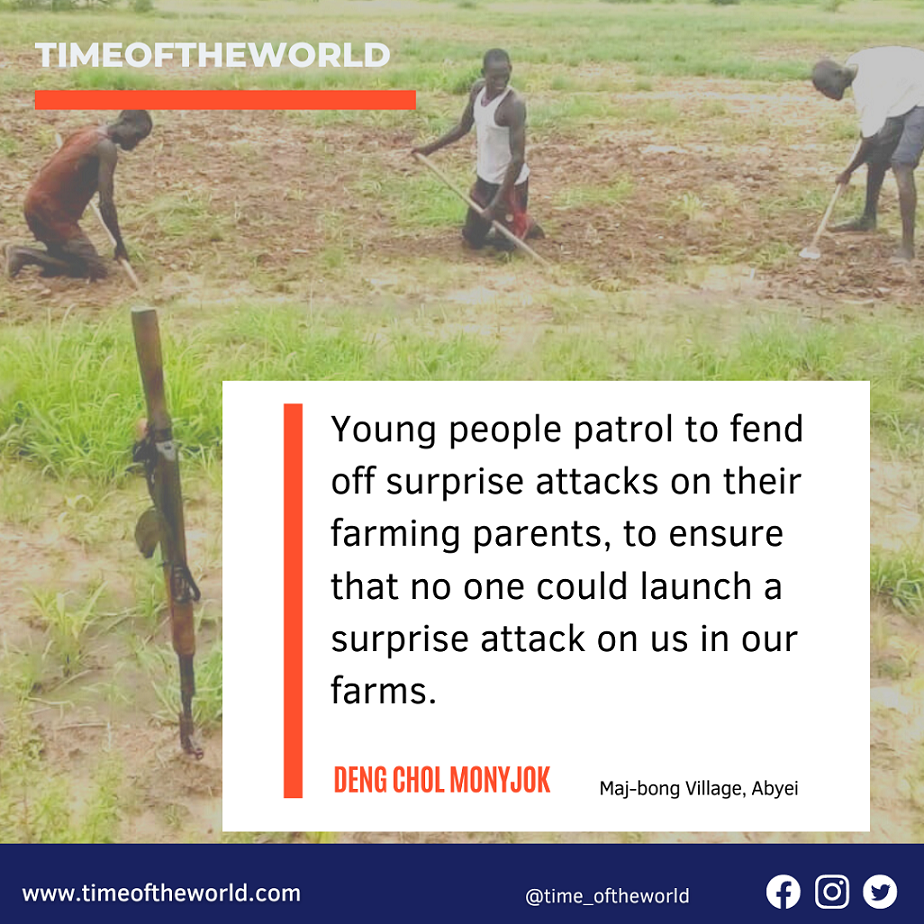“Young people carry out patrols to fend off surprise attacks on their farming parents – to ensure no one could launch a surprise attack on us in our farms.”
Communities, responding to gun-related forced displacement of farm labour and to fears of impending attacks, farm in groups, reports DENG KORCHIEK AYOM
Auok Aguek, a mother of four, recently returned to her village, Chetak, South of Abathok, in Abyei – a contested province between Sudan and South Sudan. Aguek’s village was a hotspot of fighting between youth from two other communities this February. The armed groups of the two warring communities targeted some members of this village.
Aguek says that she was motivated to come back to her village by the return of other villagers.
I find her preparing to join women for a health briefing at a nearby health center.
In a far off village, ten or so kilometers away, Maj-bong village, we find Deng Chol Monyjok taking tea with his peers in Maj-bong market. Chol has just returned from his farm. He looks tired after walking for hours, through flood waters, to get to his farm.
Marco Michar Nyok Bar returned to his home in Abathok village, South of the Kiir river two months after narrowly surviving death. He says he lived a comfortable life before the communal fight reached his village on February 22, 2022.
The fighting displaced him into Nyintaar village, about five kilometers east of his village Abathok.
He shared one room with another internally displaced man in the homestead of one Deng Kur Adol. He stayed there for two months.
Nyok has many heads of goats and 3 acres of land to cultivate.
He works daytime in a farm near his home.
He is blind.
I find him relocating his goats to the roadside for grazing.
Four teen boys are helping him to sow seeds, a task they would complete by day end.
One Farm at a Time. All Hands on Deck
In different villages, communities are farming in groups as a response to lingering fears of sporadic attacks by warring groups and to the loss of manpower from the gun-related forced displacement and exit of able-bodied persons from the villages to towns or to other villages that are denying communities farm labour. A conflict between Ngok Dinka in Abyei Administrative and Twic community in Twic County of Warrap on 10th February 2022. The fighting erupted in Agok town due land border disputes. As a result, lives were lost, property destroyed or looted, thousands displaced, and livelihoods affected. Farming is the major activity practiced by the two communities to secure their food. Many people along the hot spot villages failed to cultivate their lands amid fears of attacks. However, a significant number of villagers resisted and sowed their soil.
In Maj-bong village, the community, while bridging manpower gap by working in groups, split tasks by age and sex. Elderly men and women cultivate the farms. “Young people carry out patrols to fend off surprise attacks on their farming parents – to ensure no one could launches a surprise attack on us in our farms,” says Chol.
Aguek says that they work in groups every two days, picking one farm at a time, collect money to buy food and cook while working in the farms, and eat together.
Everyone pays what they can afford. They agree on timetable of which farm they go to, after every two days’ rest. Any woman from their village willing to join in their group is allowed to join.
Abathok village is different in the sense that, the communal help is not formalized. In fact, the boys are farming Nyok’s land out of sympathy. Nyok says that he relies on the sympathy and energy of young people to carry out the work in hard times, such as these.

Community members say that communal digging and cultivation has helped their violence-plagued villages to secure food sources for next season.
“Many farmers in our area have successfully cultivated their lands this year,” Chol tells timeoftheworld.com.
Aguek says that during the September planning season, the village succeeded in cultivating all their farms and secure seeds and food through the communal contributions… “Everybody managed to cultivate and stay safe,” .says Aguek. She estimates that her village has just over 100 people.
Nyok says that he has managed to cultivate and clean his farms from weeds and that his sorghum crops are yielding well.
Even Nyok, whose village has no formalized group farming system, says that the quantity of land he has been able to cultivate would secure enough food and planting seeds for next year.
That is no small feat. Three of every four people face severe food insecurity in South Sudan. “Internally displaced population reach 2 million in South Sudan because of continued subnational and localized violence. Sporadic violence between the Dinka Ngok and Dinka Twic communities continues in the Warrap and Abyei Administrative Area (AAA) border,” according to a WFP report.

“An estimated population of over 100,000 people left the area in various directions; some fled to Abyei town; others fled to areas across Twic County in Warrap State, into Aweil East, and as far as Wau,” according to a UN OCHA humanitarian overview issued in March. “During the rounds of violence several civilians were killed and others wounded. Reports indicated that Agok town was largely deserted by the end of March. Public and private infrastructure was destroyed between Agok and Abyei Town, mainly the markets. People who displaced to Abyei town are sheltering with host communities or in some collective sites, such as in school buildings. Others are by the roadside, under trees, or in the open.”
The result is that farms have been abandoned and the region is just one level away from famine, according to Famine Early Warning System.

Farming By Day, Hiding in the Bush By Night
Despite communities coming out to help one another to clear land and cultivate before the end of the planting season, challenges have stood in the way of success.
For Nyok, communal help has not fully resolved the farm workers’ scarcity problem. “Farm workers in farms are difficult to get,” Nyok says.
While he can now cultivate food to feed himself next year, his life is far from back to normal; he does not live inside the house at night. The nights, when he has to stay alone, are still unsafe.
He says that he stays in the bush to avoid being targeted or attacked at night. “When I first returned home to cultivate, I insisted on remaining in my house, but tension was still high and fighting was still on going at that time. So my neighbors advised me not to stay at home at night. That is why we cross the main road to the other side to spend the night,” Nyok says.
Not everyone has access to equal help. Aguek says that many of the residents of the villages fled to the towns. Their farms are abandoned. The communities don’t touch such farms. Hence, the farms remain uncultivated. Aguek says that people encourage each other through action, such as lending a hand, cooperation in hard times, and thinking about the future together. If one is away, one misses out on such encouragement.
In addition, not everyone might harvest the same amount of food. Aguek says that the quantity of food that a household can harvest from the garden depends on a farmer’s ability and resources needed to get people together and to farm. The owner of the farm is expected to contribute the most resources. If one has no resources, accessing seeds can be hard. “Due to communal fight and delay of farming season this year, we faced seeds scarcity, but NGOs helped with seeds,” Nyok says.
“When I first returned home to cultivate, I insisted on remaining in my house, but tension was still high and fighting was still on going at that time. So my neighbors advised me not to stay at home at night. That is why we cross the main road to the other side to spend the night,” Nyok says.
To be helped, you must be available to help. Aguek says that many of the residents of the villages fled to the towns, abandoning their farms; The communities don’t touch such farms. Hence, the farms remain uncultivated. Aguek says that people encourage each other through action, such as lending a hand, cooperation in hard times, and thinking about the future together. If one is away, one misses out on such encouragement.
In addition, not everyone might harvest the same amount of food. Aguek says that the quantity of food that a household can harvest from the garden depends on a farmer’s ability and resources needed to get people together. The owner of the farm is expected to contribute the most resources.
Love to Get Your Hands Dirty? Welcome to Try It
We Like to Get Our Hands Dirty
Aguek says that other farming communities that face communal fighting can borrow their experience. “This is possible to implement in many similar communities,” she says.
Nyok says that young people are key to the success. “It can be implemented in many areas, but it depends on response of young people and resilience of the community,” says Nyok.
Deng Chol Monjok says that customs play a role.
“Our experience cannot be implemented in other areas because people are not the same, such as, we Ngok Dinka people, we don’t prefer to be assisted by [outsiders]. We like to get [farm] our food by our own hands, instead of waiting for help from others,” Chol says.
“Also, the situation or conflict may not be the same with ours. That is why it might not work in other places.”
Contributing Editor: Karbino Dut Aguek | Executive Editor and Program Manager | Abyei Information and Radio Service (AIRS). Editor: Badru Mulumba




